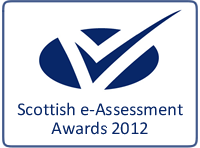2012 Winners
 The Scottish
e-Assessment Awards, launched in 2009, recognise excellence and innovation in using
e-Assessment to improve the educational experience of learners. The Awards are open
to entrants who have developed products/processes in Scotland, or are using
products/processes within a Scottish organisation.
The Scottish
e-Assessment Awards, launched in 2009, recognise excellence and innovation in using
e-Assessment to improve the educational experience of learners. The Awards are open
to entrants who have developed products/processes in Scotland, or are using
products/processes within a Scottish organisation.
Organised by the UK’s e-Assessment Assocation in partnership with Soffed, the Awards are offered in the following categories:
In 2012, we celebrated winners in the following categories:
- Formative e-Assessment
- Facilitating e-Assessment
- e-Portfolio
- Lifelong Achievement
The following criteria was used by the judges to guide them in the evaluation of submitted entries:
- 1. Has a positive impact on learning and teaching
- 2. Demonstrates sound design principles
- 3. Supports and promotes inclusive practice
- 4. Engages and motivates
- clear guidance, with examples, on how the assessments contribute to learning and teaching
- a range of actions, following an assessment, providing positive links to the next stage of learning
- opportunities for learners and teachers to use the outcomes of assessments to structure learning in a consistent way
- a close match between the nature of the challenge to the learner and the learning objectives covered in the content
- evidence that the objectives are attainable at each step, but cumulatively challenging enough to offer concrete learning development
- encouragement for learners to demonstrate understanding and achievement in original ways possibly not available in traditional learning materials
- evidence of a coherent overall design strategy
- prompt and sufficiently detailed feedback to learner actions during the assessment to sustain learner interest
- if designed to be adaptive, evidence of adaptability, flexible access and opportunities to support personalised learning – is feedback tailored to individual users?
- motivational screen design appropriate to the intended audience easy navigation and clear indexing
- appropriate feedback and outcomes which positively contribute to learning and teaching
The judges assessed entries against a range of features, such as:
- e-Assessment matched to a range of learning styles, together with adaptability and flexibility where appropriate
- accessibility by a wide range of users
- the potential to enhance the learning experience by customising features – e.g. alternative formats, audio options, or adjustable text size
- strong support for learner autonomy through variation of pace or differentiation of tasks
- evidence that the instrument addresses user diversity, avoiding bias and stereotyping
- use of ICT to offer new opportunities for engaging and motivating learners
- ways of recording learner achievement that promote motivation
- effective feedback mechanisms that stimulate and maintain learner interest
- sophisticated feedback, addressing learners’ misconceptions, together with proposals for appropriate remedial action
- opportunities for building confidence and self-esteem
Headline Sponsor
eAS Gallery
Keynote Fiona Leteney
Delegates in workshop session.
Keynote Helen Keegan
Keynote Catherine Cronin
Registration
Registration
Workshop session
Delegate bag
Meeting the exhibitors
Derek Jones and Matt Wingfield
Angus College Award
UWS eLearning Team and Matt Wingfield
Keynote Fiona Leteney
Pic n Mix
Workshop
Discussions
Doug Belshaw and Catherine Cronin
Deep in Thought
Doug Belshaw
Keynote Helen Keegan
eAS Tweets
- @eAssess There are no plans to run the conference in Dundee this year. 06:31:11 AM June 27, 2015 from Twitter for iPhone in reply to eAssess ReplyRetweetFavorite
- @rxparsons Now you have 2 followers! Really must get back into tweeting! 10:41:56 PM April 28, 2015 from Mobile Web (M5) in reply to rxparsons ReplyRetweetFavorite
- Thanks to all who have sent back feedback on @eassessscotland Lucky winner of the £25 Amazon voucher is Colin Levey! Enjoy... @DundeeDental 02:04:52 PM October 03, 2014 from Twitter Web Client ReplyRetweetFavorite
- RT @reedyreedles: *NEW POST* Notes/Slides from eAssessment Scotland 14 conference Keynote http://t.co/pGisXCufXX #eas14 11:02:42 AM September 08, 2014 from Twitter for iPad ReplyRetweetFavorite
- RT @mathewhillier: Enjoyed #eAS14? Have more! The online @eassessscotland joint @transformassess conf starts Monday! e-Exams theme. Reg htt… 01:25:24 PM September 07, 2014 from Twitter for iPhone ReplyRetweetFavorite
- RT @glynnmark: Comments from the audience on my learning analytics presentation at e-Assessment 2014 http://t.co/hzc0SiDmEH #eas14 via #pad… 02:52:15 PM September 06, 2014 from Twitter for iPad ReplyRetweetFavorite
- RT @navhundal: Home at last, thanks @eassessscotland what a great day #eas14 02:52:09 PM September 06, 2014 from Twitter for iPad ReplyRetweetFavorite
- RT @glynnmark: Excellent day at #eas14 . Great conference, great people. I would highly recommend it 02:52:02 PM September 06, 2014 from Twitter for iPad ReplyRetweetFavorite

